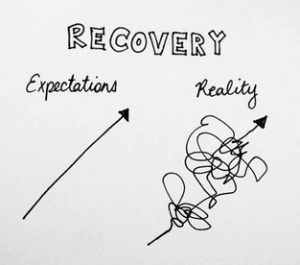For this year’s NEDA (National Eating Disorder Awareness) Week, we are going to give you some helpful insight into how to create a supportive environment, away from diet culture, for your loved ones in recovery.
To start, it’s important to remember that everyone’s recovery journey is different. Recovery is not linear. We expect our loved ones to continue to recover on an upward trend, when in reality it looks much more like this… In order to truly support your loved ones, you should ask them exactly what they need from you. Check in with them often. Guaranteed, they will appreciate your willingness to listen, while feeling supported and encouraged. No matter where someone is in their recovery, there are a few things that are never helpful. Not just for those in recovery, but for those at risk of developing an eating disorder.
To start, never comment on someone’s weight. You may think you are giving them a compliment, but you don’t know what type of ramifications a simple comment could have on their recovery. Telling someone they look healthy may sound like a great compliment to you. But for the person in recovery, the only thing they hear is “you’ve gained weight.”
Gaining or losing weight has nothing to do with character, strength or will-power. Our worth does not come from our appearance. Society has taught us otherwise, and it is our responsibility to change that.
In addition to banning all comments regarding weight, never make comments on food or food habits. For many people in recovery, a healthy relationship with food is something they have never experienced. No need to comment on how “bad” a certain food is. There are a few common phrases that lend to the culture of disordered eating. For someone in recovery, this type of phrasing can be a devastating blow to their recovery.
“Oh my gosh, I can’t believe I ate that cake, I’m so bad!”
Eating a certain food does not make you “bad.” If you are feeling guilty about one piece of cake, you might need to look into what is driving those feelings.
“I didn’t eat ALL day so I could save room for this meal.”
Not only would every nutritionist in the world tell you this tactic doesn’t make any sense, this is also a habit of disordered eating.

If you truly enjoy going to the gym twice in one day, go for it! If not, don’t worry about it! You don’t “earn” the right to eat. You don’t have to “make up” for nourishing your body.
Along with the way we talk about foods in general, we have to mention the way we talk about “fad” diets. Let’s be clear that although diet culture may not cause an eating disorder, it absolutely drives the continuance of one. Any diet that asks you cut out entire food groups, or puts a time limit on your hunger cues, is disordered eating.
I recently had a conversation with my nutritionist about how much I wanted to try a certain fad diet. I told her that other people had tried it not because they wanted to lose weight, but because it made them feel better and gave them more energy. I told my nutritionist that health benefits were the reason I wanted to try it. Of course, I was lying. I didn’t care about feeling good, I just wanted to lose weight! My nutritionist asked me if I, or any of my friends who were doing this diet were to gain some weight while on the diet, while still feeling the effects of more energy, would we continue to participate in said diet? I can’t speak for anyone else, but my answer was absolutely not. This was a wakeup call for me, to check my motivations behind my food choices. Participating in a diet can make you feel powerful, accomplished and successful. If you find yourself wanting to participate in a fad diet, check your motivations. If they are pure, go for it. If you are hoping for weight loss, or a feeling of accomplishment, take a step back. Whatever your motivation may be, it is a huge danger to discuss those diets with someone who is in recovery from an eating disorder, or at risk of developing an eating disorder.
As a final note, I want to remind readers what an eating disorder really is. It is not a fad diet gone wrong. It is a mental illness with the highest mortality rate of any other mental illness. The glamour of losing weight is a facade. The fact is, eating disorders look more like thinning hair, bruised knuckles, heart failure, osteoporosis, fainting spells, severe digestive issues, and so much more. Not all of these health concerns can be reversed. Please, remember this the next time you are tempted to participate in, or promote any unsafe diet.
As someone who spent 12 years in and out of an eating disorder, and 4 more years solely working on recovery, I would beg you to leave all diet and weight talk behind you. If you have concerns for yourself, talk to a doctor or nutritionist! Otherwise, it does much more harm than good. If you aren’t quite sure if something is okay to talk about with someone, ask them! You don’t have to have all the answers, but you must be willing to listen. For more information on eating disorders check out https://www.nationaleatingdisorders.org/.
Author: Lisa Johns, Victim Advocate – Human Trafficking at Common Ground





